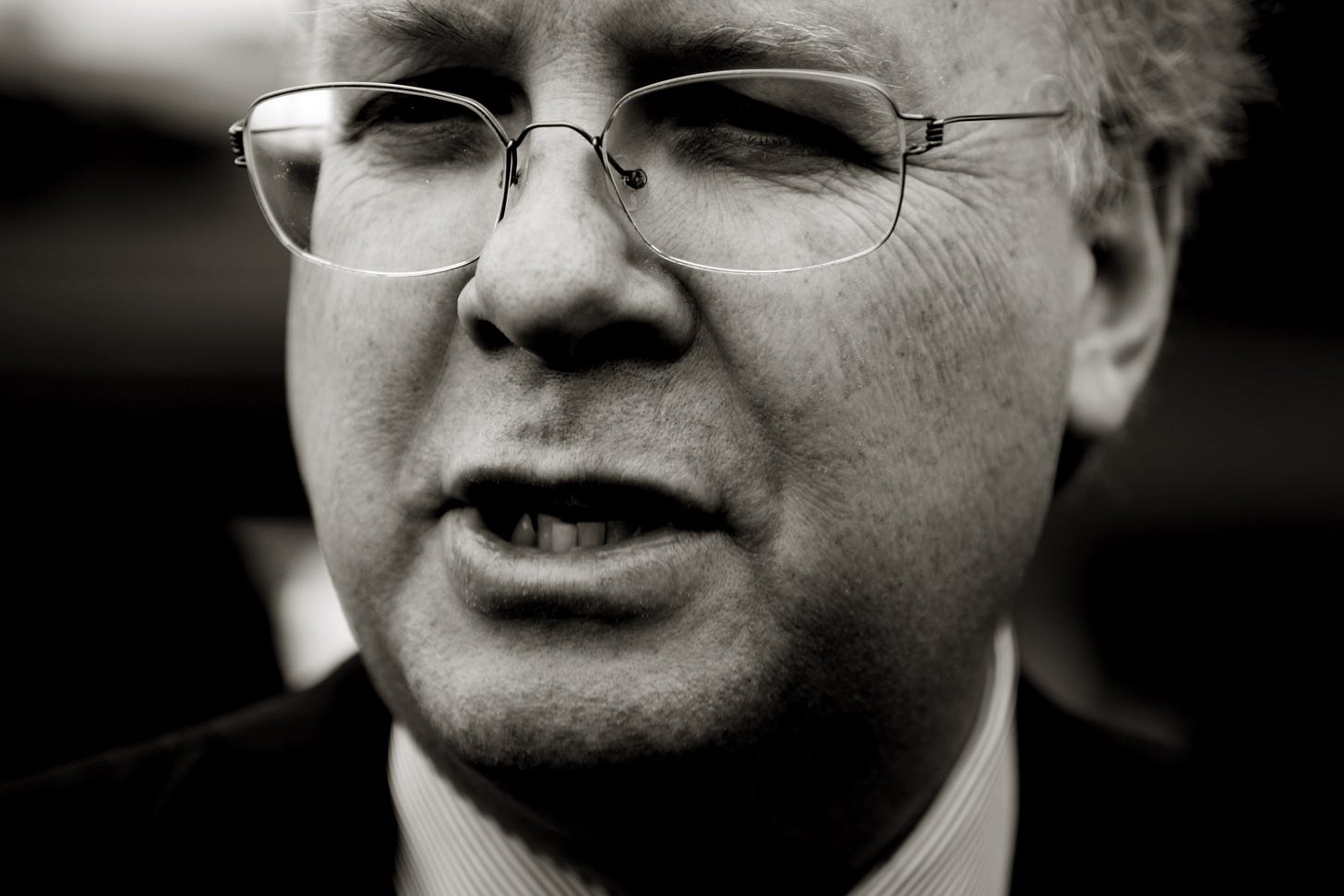Who Is the Real ‘Architect’ of Today’s Republican Party?
When assigning blame for the Trump takeover of the GOP, don’t leave out Karl Rove.

DESPITE DONALD TRUMP’S DOMINANCE in national surveys of Republican voters, the party’s fundamental dynamics revealed in the 2022 midterms have not changed: the GOP is still coming apart at the seams.
Recall that, in more than a few of last year’s races, MAGA candidates won primaries but lost in otherwise winnable general-election races. The ensuing power struggle between the mainstream “establishment” Republicans and their headline-grabbing MAGA cohorts did not end with the historic stalemate over the House speakership six months ago. It continued through the fight over raising the debt ceiling in May and June, with Republicans openly squabbling on the floor of the House of Representatives. Even now, House Republicans are fighting over whether or not to proceed with an impeachment of President Joe Biden (for what is not clear).
So it is worth returning yet again to one of the big questions of the last eight years of our nation’s political life: When did the Republican party stop standing for lower taxes, a strong defense, and less government regulation and go down the path of conservative populism fueled by an obsessive drive to wage war against the coastal progressive culture? What led to its pervasive, Trumpian realignment?
The proposed explanations vary as widely as the writers proposing them. Some give Trump the lion’s share of the credit or blame. Some look back to the Tea Party as a sort of precedent. Some say the realignment was a delayed reaction to the Iraq War. And others point back to how Newt Gingrich changed the party, or Ronald Reagan, or Richard Nixon, or on further back in time, in the rise of modern American conservatism.
For my part, I am struck by what we might say about another figure—one both loathed and revered in Republican circles. In 2008, I published Machiavelli’s Shadow: The Rise and Fall of Karl Rove. For the book, I asked Republican insiders what they felt Rove’s legacy would be. Rove had dominated political thought for the first seven years of the George W. Bush White House until he became so toxic he was forced to leave, having failed in his promised attempt to create a permanent Republican majority so spectacularly that the party lost the House in the 2006 midterm elections which, as it happened, brought to prominence one of the Republicans’ new nemeses—Nancy Pelosi.
The comments about Rove made to me during my research in 2007 seem prescient today. Behind the remarks is the idea that by emphasizing politics over policy as he did, Rove shifted Bush—and therefore the party—from centrist to hard right. “Instead of having a permanent majority,” Tom Pauken, the chairman of the Republican Party of Texas during the 1990s, told me,
Rove has potentially put in place a situation that will lead to the destruction of the Republican party as we’ve known it in the Barry Goldwater-Ronald Reagan tradition. Rove has taken what people have worked thirty years to achieve . . . and squandered it all away. He’s participated in the potential destruction of the conservative movement in the long term.
Matt Towery, a protégé of Gingrich, said, “Every Republican I know looks at the Bush administration as a total failure. I felt like the political operation was running things, so they never created policy goals. Political consultants are paranoid by nature. That’s the thing about the Bush White House—no one knew who was in charge and yet everyone knew: Karl Rove.”
And what did Rove do with that power? “I think the legacy,” said Ed Rollins, a longtime Republican political consultant, “is that Karl Rove will be a name that’ll be used for a long, long time as an example of how not to do it. Rove could have broadened the base of the party. He had an opportunity to strengthen state parties. But, I think, at the end of this, the party will be weaker in numbers in the Congress . . . and numbers of Republicans. He did little to attract young people to become Republicans. Nobody who’s come of age during the Bush era will stand up and say, ‘I’m going to spend the rest of my life being a Bush Republican.’”
So, the criticism of Rove was based not only on his political methods, which in its article on his White House exit one newspaper described as “aggressive, combative, secretive,” but also on the direction he took the party. Why did he do it? Ostensibly in order to secure Bush’s re-election, an obsession with Rove since Bush’s father, George H.W. Bush, lost his re-election bid to Bill Clinton. Operating under the theory that Bush Sr. lost because he was too liberal-leaning on a range of topics, particularly cultural issues, Rove moved Bush to the right—most notably, as the 2004 campaign season was getting underway, having him propose a constitutional amendment opposing same-sex marriage.
That move, along with nearly a dozen proposed state constitutional amendments on ballots, made same-sex marriage a powerful wedge issue in 2004. And just as Rove wanted, that issue, along with others on which Bush staked out social conservative positions, helped ensure that he did not lose his conservative base in 2004, as his father had in the strange election of 1992.
But these maneuvers also meant that, once Bush left office in 2009, deeply unpopular thanks especially to the wars, there was no clear next step for the GOP, no one positioned to inherit the mantle of leadership. Rather, the party faced an intellectual and leadership vacuum that left it vulnerable to the right-wing populism of the Tea Party, a movement that got underway just weeks after Bush left office, which led a few years later to the House Freedom Caucus, whose inaugural meeting in January 2015 was described by Mick Mulvaney as being “the first time we . . . decided we were a group, and not just a bunch of pissed-off guys.”
Such “pissed-off” people would mostly have been outsiders in the political world of Bush Sr.; these days, however, under the weak speakership of Kevin McCarthy, for all intents and purposes it is the pissed-off Trump acolytes who more or less run the House, an indication of how far the hardliners have come since Rove opened the door to them.
It would stretch the truth to say that Rove deserves all or even most of the blame for the state of today’s Republican party. But looking back, and recalling Pauken’s remarks about “the destruction of the Republican party as we’ve known it” and “the potential destruction of the conservative movement,” anyone who leaves Rove out cannot understand the story of the rise of Trump and the remaking of the party he has come to dominate.





